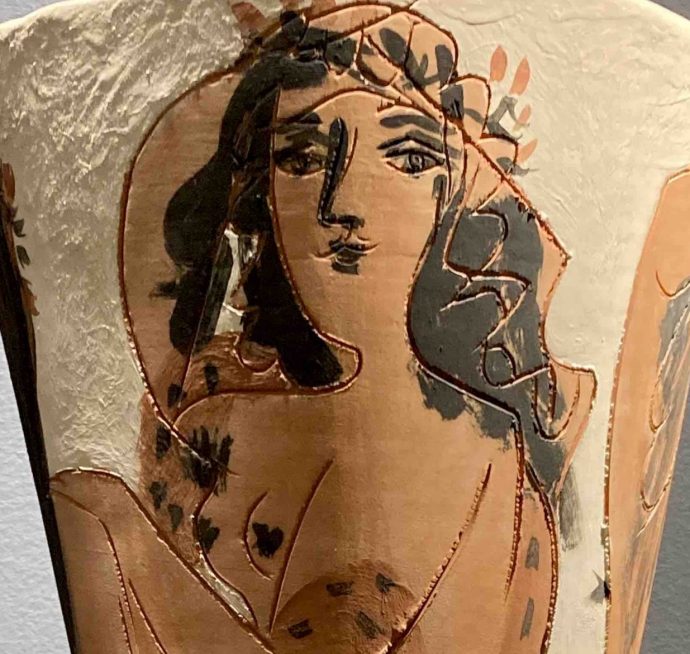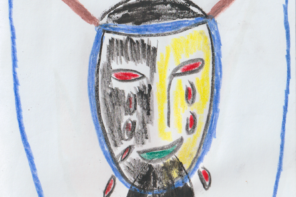This excerpt from Iana Boukova’s novel Traveling in the Direction of the Shadow is, in many ways, representative of the book as a whole: it allows us a glimpse into the polyvalent, cadenced, and freely associative manner—more characteristic of poetry than prose—in which the author employs language; it gives us a feel for the ironic but at the same time compassionate way that she handles the characters; and it offers us a taste of how the metafictional narrative functions on several levels at once, by recounting specific events and simultaneously creating metaphors for reading, writing, and translation.
But the excerpt is also exceptional in several important ways.
First and foremost, it is the most literary section of the book by far. Which, for a novel like Traveling in the Direction of the Shadow, is really saying a lot. Boukova’s erudition, the intertextuality of her writing, and her kinship with an international community of authors—ranging from Marguerite Yourcenar, Italo Calvino, and Gabriel García Márquez through to Clarice Lispector and Olga Tokarczuk—are apparent throughout the novel, and it is up to readers to notice these connections, depending on their own sensitivities and literary interests. But it is in this part of the book specifically that Boukova makes some rather difficult-to-miss nods to several canonical works of global literature. Readers are bound to think of Kafka’s Metamorphosis when they encounter the incident with the cockroach and read about the terror it produces in the main character and his tutor, before being squished to death by a maid. Some readers will also recognize that the character who appears at the end of the section and introduces himself as “Nobody” in ancient Greek is a tribute of sorts to Outis, the pseudonym that Odysseus assumes in the Odyssey. And there is, of course, the rather extended reference to Borges and his brief prose piece “The Four Cycles,” on which Boukova puts her own, rather tongue-in-cheek spin, inspired by the lives and natural habits of insects.
Secondly, while some familiarity with the author’s biography and background would probably enhance the readers’ experience of the novel as a whole, this particular excerpt could especially benefit from such knowledge. The claim that what killed the Latin language was tedium gains substance—and humor!—when we know that Boukova’s own educational background is in Classics. We can almost imagine her, as a high schooler at Bulgaria’s National School for Ancient Languages and Cultures or a student of Classical Philology at Sofia University, spending “hours counting long and short syllables, scanning them aloud, and patiently marking the rhythm by leaning on [her] elbow and moving [her] forearm up and down.” By extension, the remark about “the sort of complex Alexandrian rhythms that only a master like Catullus could employ effortlessly in Roman poetry” is rendered with gravitas when we know that Boukova has translated Catullus’ entire poetic oeuvre into Bulgarian.
Needless to say, the fact that my own academic background is not in the Classics made this section somewhat challenging to translate. But it’s worth noting that the reader—of both the original and the translation—does not need to be an expert in ancient Greek or Latin in order to read, understand, or enjoy the chapter. Although some knowledge certainly helps—and Boukova seems happy to provide a bit of assistance. It’s no accident that all but one of the total of eight endnotes provided by the author and included in the original Bulgarian edition of the book, whose total length is 312 pages, come from this exact thirteen-page excerpt. (This is another element that makes this excerpt exceptional.) Careful readers might notice that the English translation contains an additional endnote that explains the meaning of the word “remora,” which is not found in the Bulgarian. Although the term’s definition is given as a direct quotation from Isidore of Seville’s seventh-century encyclopedia Liber etymologiarum within the text, Boukova and I agreed it would be beneficial to add an endnote with a more detailed (and slightly updated, to include another Borges reference) explanation—especially since the word shows up as the following chapter’s title and, as such, performs an important function in the novel’s conceptual construction.
By this point in the book, readers will have probably noticed that Boukova is very deliberate when choosing the names of the novel’s characters—which also serve as the main titles of the eight chapters—so that these names perform deeper semantic and connotative work beyond their mere denominative function. The name of the character featured in this excerpt, who eventually emerges as the book’s narrator, is no exception. This is why it has to be transcribed in such a way as to allow readers to make the connection between the nineteenth-century Dutch traveler Ian van Athen and the Bulgarian author whose first name is Iana and who has lived in Athens since the mid-1990s. The importance of retaining this connection in my translation—which in the Bulgarian original isn’t obvious but is definitely noticeable—took precedence over transcription conventions, which would’ve required that the Dutchman’s name be spelled Jan van Atten, thus completely obscuring the link.
By extension, this section of the book is particular because it is precisely the part that—in introducing the narrator—marks a significant upending of the overarching narrative. The first part of the novel consists of five chapters (Chapter One can be read in installments, starting here), each of which outlines the cradle-to-grave “biography” of a different character—although far from simple, linear, or straightforward, the plots in these chapters are at least made to seem like they’re told by a reliable narrator. This perception, however, begins to crack with the appearance of Van Athen in the sixth chapter, and completely shatters with the unfolding of his own biography. It is precisely the excerpt we see here that gradually reveals his utter unreliability as a narrator who is more concerned with generating “abundant similes” and creating epithets that smoothly “attach themselves to their respective nouns,” than with actual fact (even if that fact is fictional).
The creation of this writerly “alter ego,” as Boukova herself calls Van Athen, may at first sight seem like nothing more than just another of the author’s playful puns, or a decision dictated by the fact that travelers around the Balkans in the nineteenth century were most likely to be West European and male. And although it is undeniably humorous, it also opens up a space in which to question perceptions of what constitutes “women’s writing” and critically examine literary tendencies to exoticize or “anthropologize,” especially when writing about the past and/or about a region such as the Balkans.
In lieu of conclusion, and on a more personal note, I should mention that this is one of my favorite parts of the whole book and one on which I’ve enjoyed working the most, both despite and because of the numerous challenges it presents. I hope that reading it gives readers of The Spectacle at least a part of the pleasure that I experienced while translating the excerpt, and that it makes them curious to discover more about Iana Boukova and her work.




